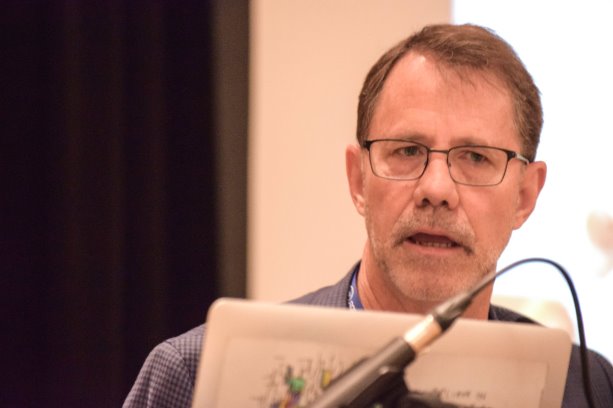Award-winning author and futurist Rex Miller says the way most construction projects are carried out now drives good people to do bad things.
The system is designed to create mistrust, with procurement practices and contracting models working against effective team management, he told attendees during his keynote address at the Lean Construction Institute — Canada’s conference in Toronto recently.
"We know projects consistently are late and over budget. Research is somewhere around 70 per cent," Miller said, adding 40 to 50 per cent of the cost of a project is waste and non-value added activity. "The risk culture, procurement culture and the insurance culture are three of the big hurdles to overcome."
He said the way projects are carried out and the various players interact with one another needs to evolve from the practices of the past in order to keep pace with today.
"We’ve moved from an era where that model used to work — you know linear, sequential process flow. Now you can have over 500 different kinds of trades and players on a project. We’re moving at an accelerated pace. We’ve got more interconnected pieces, so it’s complex," he explained. "This kind of industrial, mechanical way of breaking down work breaks down under speed and complexity. So now this shift needs to be more on how the team works together."
Miller has co-authored several books, including the Commercial Real Estate Revolution, which is meant to provide a roadmap for changing the adversarial nature that’s present on many construction projects.
Rex Miller
Author
"In an environment that changes rapidly, that’s complex, the quality of the team dynamic…has to begin by an environment where people feel safe, where they are able to express themselves," he said. "How well can you play together?
"All the big problems start on day one. How prepared we are, what the tone is, who’s at the table."
It also starts at the top with the owner or developer.
"It’s the owner that sets the tone. It’s the developer as well. In Canada the developers are much further behind in this kind of thinking than in the U.S.," he stated. "They’re building commodity products that have to have a certain ROI…it’s a financial model, it’s not a real estate model."
During his presentation Miller outlined several aspects of behavioural economics that can factor into effective or ineffective project delivery.
There are typically four stages that teams can go through during a project: form, storm, norm and perform.
Forming is what happens when people come together, where people are cordial and polite with one another, a "romance" period, Miller explained.
In effective project delivery this stage goes beyond good intentions and means setting aside the time to meet and get to know who you are working with, as 85 per cent of your success is going to be determined by your emotional intelligence, meaning people skills and appreciating the unique views of others.
The storm stage is when the initial politeness fades and the tone begins to change. Miller said most projects get caught in the form and storm stages without moving beyond the differences to the norm stage, where conflicts are worked out and the focus turns to the tasks at hand. Getting to the norm stage can ultimately achieve the last stage, which is perform.
"We have a lot of smart teams but we don’t have a lot of healthy teams," Miller stated, adding trust is paramount to success. "Trust is not a default. It is work and it is intentional. It is structured and it is disciplined."
Miller also added it’s important to not underestimate "the power of why."
"Why is this project important for the people you are building it for?"
He recalled a children’s hospital project in the U.S. where workers and patients gathered together for events as a way for those involved in the project to see how their work was making an impact. A drywaller who was working on the job in an area that was to become a cancer treatment section for children realized that dust is harmful to kids with cancer.
"In true lean fashion, he came up with a way to minimize the dust," Miller explained, adding that’s the value of effective team management and stressing that their work matters and isn’t just about the bottom line.
Overall, Miller said getting it right from the get-go is vital to any project’s success.
"Spend more time on the front end, getting the team dynamic right, tapping in and fully appreciating and understanding the diverse set of talents that come to the table. Appreciate them and embrace them," he said.
"People love to do good work and they do good work when they get to do what they naturally do best and enjoy most."











Recent Comments
comments for this post are closed